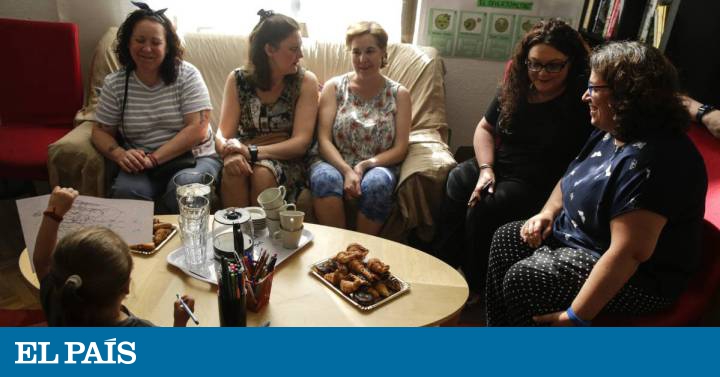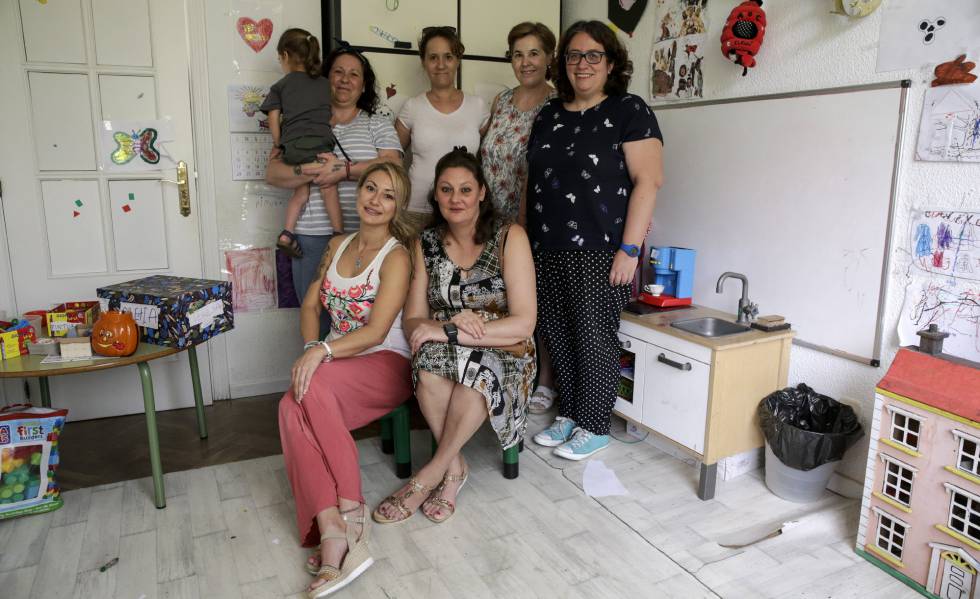Being a mother with mental illness: “They told me, the best thing they could do to you is to take your children” | Society

Gema Juanas, 43, gives off and spreads energy. Vital and talkative, it is the one that breaks the ice when one of the mothers gathered for this report is asked to tell their experience. It is hard to imagine her eight years ago, when she was, as she describes, "broken, undone, because I had lost everything." Diagnosed with paranoid schizophrenia with delusional jealousy and two children, then five and three years old, did not take the medication. "It made life impossible for my partner," he acknowledges. So when he filed for divorce, he was left with nothing. “They took away my children's custody, I was on the street, without income, with an absolutely unstructured life,” he recalls with absolute naturalness.
Juanas is part of 43% of fathers and mothers with some mental disorder of the Community of Madrid who, according to a study by the Complutense University with the Manantial Foundation, He ends up losing the guardianship of his children. Psychiatric diseases, especially in the case of mothers, not only leads them in many cases to be separated from their children, with the suffering that it entails for everyone, but also affects the mental health and behavior of the little ones. To prevent this risk and help these women, for whom being mothers is the greatest incentive to take care of themselves, the foundation launched in 2011 Green house.
"It's a project to run away from psychiatric centers, that looks like a house, where they feel like in a family," explains its director, the psychologist Raquel del Amo. In this small apartment in the Madrid neighborhood of Vallecas, pregnant women and mothers with disorders from the most serious, such as schizophrenia or bipolar, receive therapy to others that can affect the bond with the child, such as anxiety disorder or obsessive compulsive. Also your children and other family members who may be supportive and at the same time need it, as parents and grandparents. The interview takes place in the lounge, with a coffee and some buns for breakfast. The six mothers present are in confidence, and the meeting becomes a gathering where they share experiences they have all had, such as fear and feeling marked by prejudices about mental illness.

“The best thing they could do to you is to take your children away, because you won't be able to,” Juanas was told by his own relatives. “We have encountered such obstacles; we have to fight 20 times more than a normal mother, ”he says. To the psychiatric disorder and the inherent difficulty of motherhood, which even in the best conditions overflows many women, these mothers add more handicaps. Many take care of their children alone. In some cases, they have been mistreated before being abandoned by their partners. The majority are unemployed or work "from what is coming out".
After losing guardianship, Juanas spent several months without seeing his children. It was one of the first to enter Casa Verde, derived from social services and the mental health center. Here, the team, consisting of an adult psychologist and a child psychologist, a social worker, an occupational therapist and a social educator, interceded so that he could see the children several hours a week, and accompanied her on different appointments with the judge to change the visitation regime as it improved. "They encouraged me to look for work, to regain self-esteem, to believe that I could get ahead." And they also gave him tools to raise and interact with his children. “They teach you not to beat them, to talk. A "normal" mother, if the child misbehaves in the park, gives him a couple of lashes; If I do that, the judge takes them from me. You feel that they are judging you for something that you cannot avoid, that is within you, ”he trusts.
"Mental illness is scary"
“Mental illness is scary, and when there are young children involved, all the alarms go off,” acknowledges Carlos Rodríguez, the social worker at Casa Verde. But not only to others. “The terror I had before being a mother was that my children had the same as me. I was afraid, especially because of my pain, ”says Silvia García, 45, with bipolar disorder and two girls aged 13 and 8. "You see that society tells you that you cannot be a mother, and that stigma ends up becoming self-stigma and you believe it yourself," he says. In his case, the early diagnosis, at age 20, and working with his psychoanalyst allowed him to "build a healthy maternity project." "With enough support, a mother with a mental diagnosis is capable of anything," he says.
However, that is the hard part. That is why the women gathered ask for resources to be extended such as Casa Verde, a pilot project that has served 114 families in these eight years, with 135 children and 147 adults in total. “There should be one in each neighborhood,” says Rosa, 49, and with two daughters aged 13 and 9. "They guide us and give guidelines in situations where you are not a person." Assistant of geriatrics, now takes care of his ex-husband, who suffers from schizophrenia. Although it is "physically strong," it shows "emotionally very weak."
Joana Jiménez, 37, has been here almost since it was created. He arrived with an adaptive behavior disorder with many anxiety crises. "My husband abandoned me when the child was seven months old, we both come to weekly therapy since then," she says. "I had very low self-esteem, my ex mistreated me, my son hindered me, I didn't know what to do with him," he says. At that time, Jiménez worked at night in discos, and the grandmother took care of the child. "We were totally disconnected," he describes. “I didn't even know how to play with him, I felt that it took time to be with other people. Now I have a better time with him than with anyone, ”he says. In these years, he has studied and covers substitutions as a nursing assistant.
"I feel bad mother"
Veterans comfort Mar Encinas, 46, mother of little Jairo, almost three years old, who runs, paints and plays in this center that does not look like a center as if he were at home. "My son is the reason to live," he says through tears, "but I feel bad mother." "I don't love myself, I'm always depressed, wanting to cry," says Encinas, who suffers from a personality disorder. Chelo López, 44, who is very overwhelmed, is also encouraging because from social services they propose that their three-year-old daughter spend a few days a week at the home of a relative so that the little girl "stabilizes." The case comes a year and a half ago, when Lopez, with bipolar disorder, suffered a crisis. But the experts who treat it believe that the measure, now, would not make sense. "I have panic in case my daughter thinks I don't love her," he says about the possible separation.
And is that mental illness does not alter at all, according to Del Amo, the psychologist, "the ability to love or transmit love" of these mothers, essential in the first years of life of children. Juanas corroborates it. “My children have been my goal to fight, if not what would be the meaning of my life. What I didn't think is that something so beautiful would come out of that force of mother-child love, ”he says. “My daughter says that I am admirable, because even though I am sick, I see that I love them and I care about them,” she takes pride.
The ghost of custody withdrawal
The proportion of women with severe mental disorders with at least one child is around 60%, doubling the number of men, according to a study by the Complutense University. 43% of fathers and mothers with this type of diagnosis in the Community of Madrid end up losing the guardianship of their minor children.
Withdrawal from custody is one of the main ghosts that persecute these mothers. The director of Casa Verde explains that, despite the words of thanks they express, they have had to overcome a lot of distrust. “When they are sent here they don't know us, they think we are going to judge them and we are going to take away the children. We have to make them understand that we are the best guarantee that they can maintain custody. ”
Of the 135 children who have passed through the center, there has only been one case, of two brothers, in which it has been necessary to withdraw it. From his experience, he believes that family judges "tend to be sensible, know the importance of maintaining the link," and understand that "mental illness does not determine the quality of childcare when they have support."
. (tagsToTranslate) be (t) mother (t) mental illness (t) (t) I (t) say (t) better (t) be able (t) have (t) remove (t) child (t) woman ( t) psychiatric disorder (t) (t) report (t) difficulty (t) face (t) ask for (t) support
Source link










